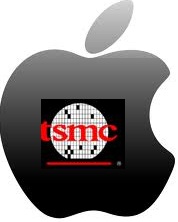The internet is a funny place where rumors are true and truths are rumors. The latest one has Apple using Intel as a foundry. This is fuel for the rivalry between SemiWiki blogger Ed McKernan and me. Ed says Apple will use Intel, I say Apple will use TSMC, we have a very expensive dinner riding on this one.
TSMC falls on possible competition from Intel
Taiwan Semiconductor Manufacturing Co. (TSMC), the world’s largest made-to-order chip-maker, fell yesterday on reports it may compete with Intel for Apple orders...
Yes, TSM stock took a hit based on a rumor so we have motive (Apple consumes more than 200,000 12-inch wafers per year). The Intel rumors started last year with Intel saying they would “like” to manufacture the Apple A4 and A5 SoCs. Clearly that did not happen nor will it. Moving an SoC amongst foundries is serious business, serious technical and political business.
Samsung and Intel manufacturing processes could not be farther from compatible. I work with Sagantec, the leading process migration company, and can tell you a migration between Intel and Samsung is not technically feasible. It would be a complete re-design. Apple uses Samsung IP. Apple uses commercial EDA tools certified by Samsung. The ROI is not there for Apple to move the Apple Ax SoC between fabs.
Let’s not forget how Apple became a fabless semiconductor company. They first started with Samsung as an ASIC customer. Apple did the initial RTL design and tossed it over the wall to Samsung for IP integration and physical implementation. Apple then acquired P.A. Semi (Palo Alto Semiconductor) for $278M in 2008 which brought serious SoC design experience in-house. Do a quick search on LinkedIn and you will see quite a few PA Semi people are still at Apple. Apple has also made other acquisitions and investments in the fabless semiconductor ecosystem.
Politically it is a problem as well. Apple’s experience with Samsung, where a vendor (Samsung) directly competes with their largest foundry customer (Apple), will definitely change the way we all do business. Qualcomm is in the same boat with Samsung. Samsung was the largest Snapdragon SoCcustomer and now the Samsung Exynos SoC is replacing Snapdragon. I was at ISSCC when Samsung first presented a paper on Exynos and saw the question line queue up quickly with competing SoC engineers from QCOM, BCOM, TI, Apple, etc. Few if any questions were directly answered as is the Samsung way.
For the record, I have no problem with Samsung competing with customers by providing low cost alternatives. It is good for consumers. It is good for the consumer electronics industry. It is good for the semiconductor ecosystem. It will force Apple and Qualcomm to innovate and differentiate at the different pricing levels. I also have no problem with the resulting legal actions as it will force Samsung to innovate and differentiate rather than replicate. It’s all about the customer experience, better products at affordable price points, that is what business is all about.
Back to the Apple “TSMC versus Intel” debate:
Can Intel be successful in the foundry business? Of course they can but it will not happen anytime soon. It took Samsung 10+ years to get to the number 4 spot. Today Intel Foundry uses the ASIC business model like Samsung did in the early days. Customers throw RTL designs over the Intel wall for physical implementation. This helps Intel learn the SoC foundry business and it protects Intel process secrets. Moving forward Intel will have to develop a fabless semiconductor ecosystem (exposing process secrets) and forge EDA and IP partnerships with the likes of ARM.
Intel will also have to avoid the competing with customers conundrum. The Intel UltraBooks are a blatant copy of Macbooks. The Intel Atom will someday compete with ARM and don’t be surprised if Intel comes out with an SoC of their own. Sounds a bit like Samsung right? Deja vu all over again. TSMC on the other hand is a pure play foundry and does not compete with customers.
My bet is: moving forward Apple will use Samsung for 28nm (iPhone 5s) and TSMC for 20nm (iPhone 6). Intel certainly has a shot at 14nm and 10nm but never ever count out TSMC. If you want to bet a lunch on Apple manufacturing at Samsung or Intel for 20nm post it in the comment section. I will cover all lunch bets against TSMC.
Full disclosure: I can eat my weight in sushi!







Comments
0 Replies to “Apple Will NOT Manufacture SoCs at Intel”
You must register or log in to view/post comments.